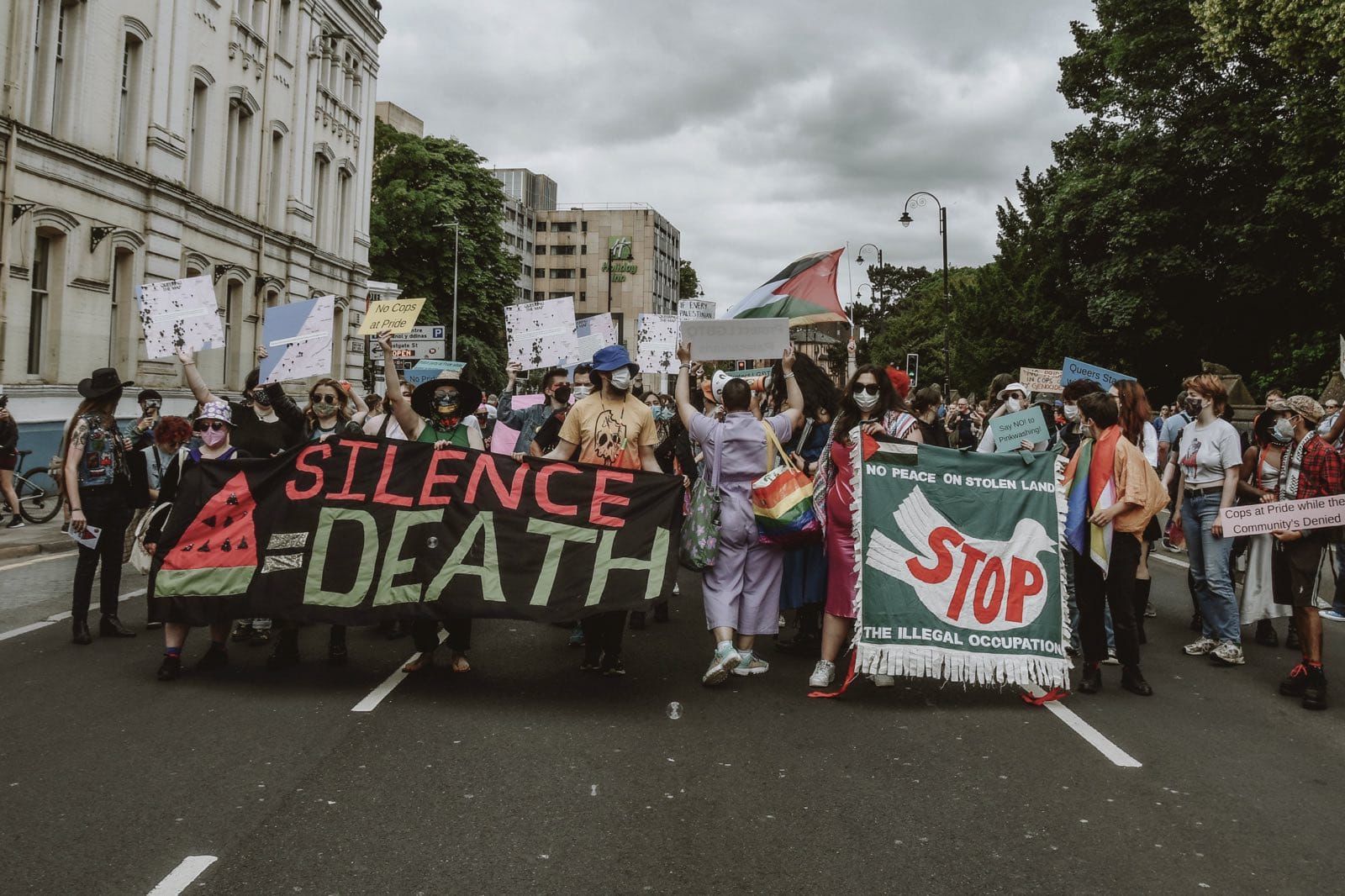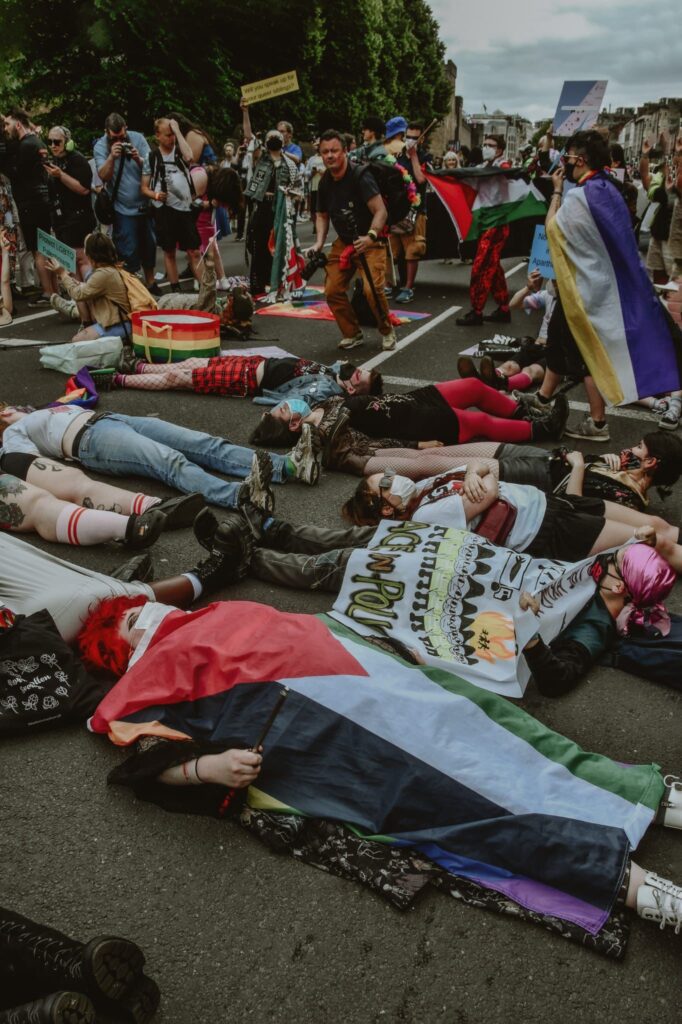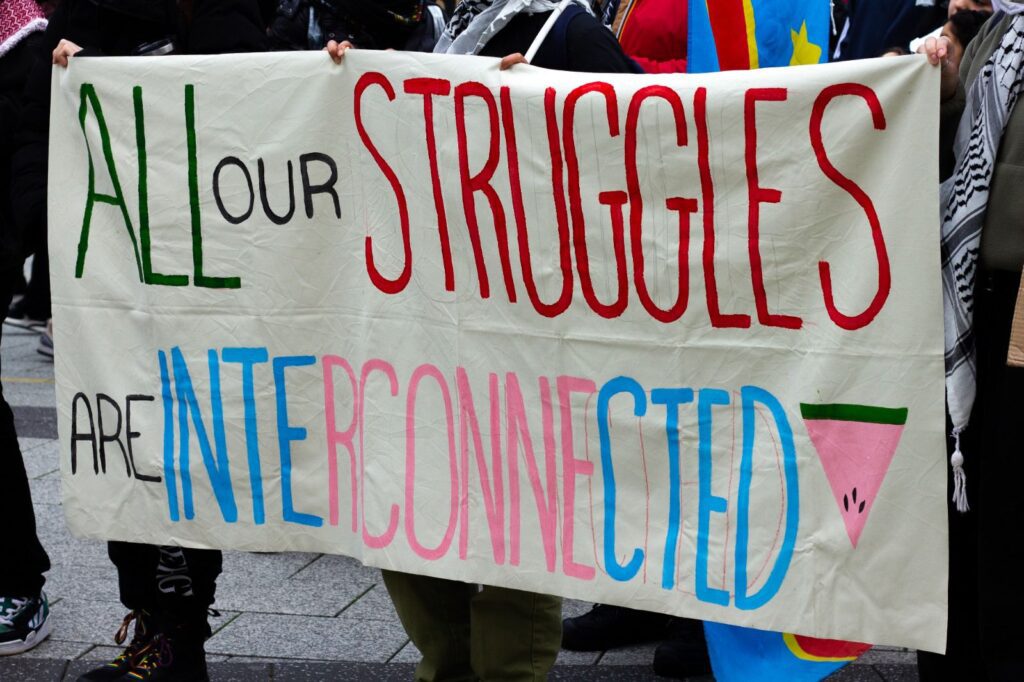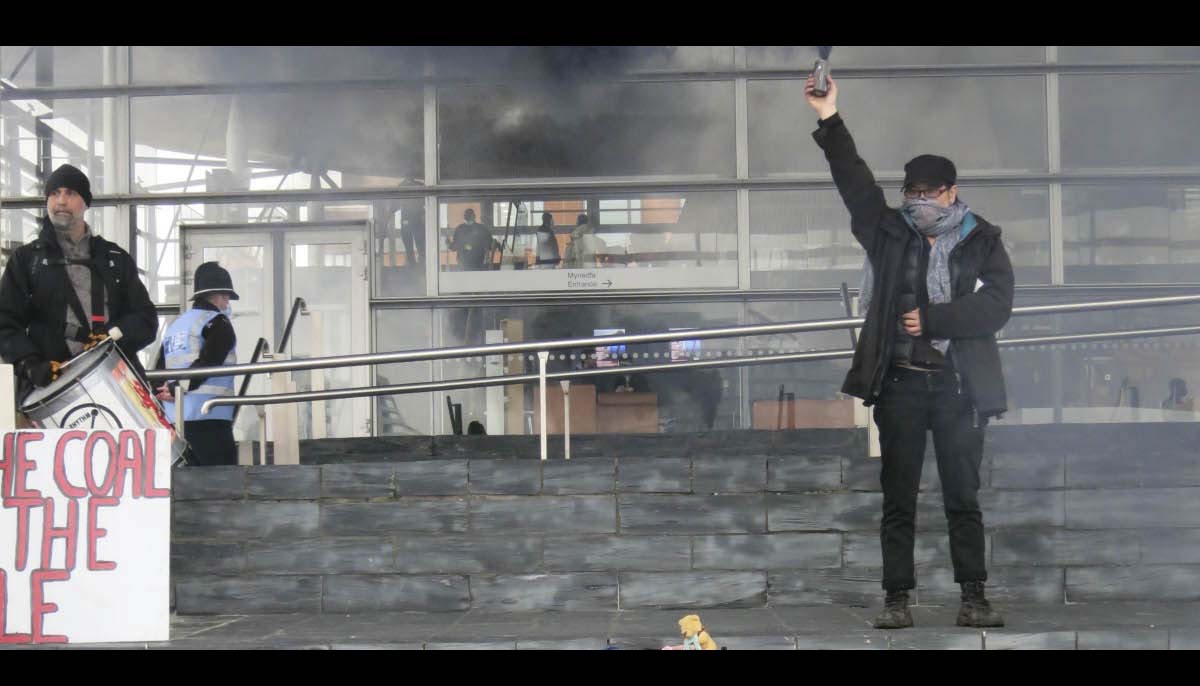
No Pride In Genocide: How Queers Fought Back Against Israeli Pinkwashing
Oojal Kour speaks to activists in Wales about pinkwashing, settler colonialism, resisting Western imperialism and the importance of collective liberation through a free Palestine. Cover image courtesy of Cymru Queers for Palestine
By Oojal Kour
Dancing to Chappell Roan in keffiyehs. Chanting ‘From the river to the sea, Palestine will be free’ with rainbow capes. Head-to-toe in pink, blue and all the colours of the rainbow. Placards painted red, black, white and green. Under a rare but welcome summer sun, Cardiff’s Big Queer Picnic felt refreshing – nothing like it’s next door neighbours marching alongside Barclays in a Primark pride tee that probably cost them under a fiver.
The two events in Cardiff stood in stark contrast – one a grassroots, inclusive event, while the other a corporate-backed march sponsored by Principality, which banks with Barclays, responsible for bankrolling Israel’s war crimes in Palestine. Embracing corporate funding at the cost of a genocide didn’t sit well with many, who instead chose to support the picnic in Sophia Gardens.
Seeing queer people stand in solidarity with Palestine isn’t surprising – their voices have been some of the loudest among those involved in the Welsh movement against Israeli apartheid. Cymru Queers for Palestine, the Welsh chapter of the UK-wide Queers for Palestine campaign, staged a die-in in front of the Cardiff Pride parade to protest against the Principality Building Society’s sponsorship of the event, and the decision to invite South Wales Police, who have been accused of targeting Palestine activists. Cymru Queers for Palestine have also consistently supported the weekly pro-Palestine marches that have taken place in Cardiff since October 7 2023.
Sammie*, a queer Palestinian-Jordanian and a familiar face at these demonstrations describes this community as “intersectional”, one that brings Arabs, non-Arabs, queer people, and people from all backgrounds under one roof. “When I looked at the people around me, I wasn’t the only one who was feeling the grief, the rage and the anger,” Sammie explained. “There was a collective grief, and you still see that in the community when we engage with each other.”
Popular right-wing discourse often argues that queer people should support Israel because Palestinian society is inherently homophobic. Netanyahu once likened Gays for Gaza to ‘Chickens for KFC’, a rhetoric echoed in an Israeli skit that mocked queer pro-Palestine supporters with signs reading “LGBTQH” – the ‘H’ for Hamas.
However, Sabrin Hasbun, a Palestinian-Italian writer, asks, “How do you think killing all Palestinians in Gaza is somehow protecting queer Palestinians? Which rights are we going to fight for if they’re dead?”
As of November 2024, the Palestinian Ministry of Health averages the death toll in Gaza at 250 people per day, with over 44,000 killed, over 100,000 wounded, and more than 10,000 missing in the besieged enclave. It’s hard to determine how many of these victims were queer, but it’s clear that far more queer Palestinians have been killed by Israeli oppression than by homophobic attacks within their own communities.

In a conversation with voice.cymru, Sabrin says that queer solidarity stems from a shared pushback against systems of oppression. “Queer communities are victims of capitalist, heteronormative, patriarchal, imperialist, and ableist systems, just as much as Palestinians. We have both been dehumanised and targeted in the same way.”
Sabrin adds, “We Palestinians have been trying to say for years that what is happening in Gaza is a test field to see how much the West is going to swallow and accept without revolting. And then, that will be translated against other communities.”
She points to the fascist riots that swept across the UK in August as evidence of this trend. “If we let oppressive systems get away with the violence that they are unleashing in Gaza, then they’re going to unleash it somewhere else. Everyone who has been marginalised by mainstream narratives knows exactly what we’re fighting against.”
“If we let oppressive systems get away with the violence that they are unleashing in Gaza, then they’re going to unleash it somewhere else. Everyone who has been marginalised by mainstream narratives knows exactly what we’re fighting against.”
While anti-racist groups have far outnumbered fascist movements, and queer support for Palestine largely outweighs pro-Zionist sentiment, the path to absolute queer solidarity with Palestine remains a long one – starting with the boycott of Israeli pinkwashing.
The Boycott, Divestment and Sanctions (BDS) Movement defines pinkwashing as an “Israeli government propaganda strategy that cynically exploits LGBTQIA+ rights to project a progressive image while concealing Israel’s occupation and apartheid policies oppressing Palestinians”.
Israel has consistently presented itself as a gay utopia in the Middle East. It holds Tel Aviv Pride, one of Asia’s largest pride events. But the pride event isn’t open to Palestinians living in the West Bank and Gaza unless they obtain a permit from the Israeli government. Sabrin questions the narrative perpetuated by Israel as “the only democracy in the Middle East”, instead arguing that it’s a facade used to “justify the Zionist project”.
Sammie, who has lived the majority of their life in Jordan, explains that Jordan doesn’t have any progress on queer rights because of Israel.
“Israel pretends to be our ally, but in reality, they are harming queer people in the region, directly and indirectly. If British queers come to Jordan on a UK passport, no one will say anything because you have the privilege of that that protects you. The people dealing with the effects of this are the people who grew up [in Jordan] and belong to those [queer] communities. You, as a person from the UK, are not going to deal with the oppression.”

Aiman*, a queer writer, performer and activist, explains how this narrative impacts countries that were once colonised, and live with its infamy. “In most countries, being queer is illegal, and a lot of queer people see this as proof of their oppression. There’s this assumption that if you exist in this country, you will be killed. That is not true.”
This then becomes grounds for justification by a bigger power to oppress and inflict violence on people in countries like Iran, Syria, Lebanon, Palestine and Sudan, Aiman explains. “When you as a country are relentlessly bombed, your entire progress is brought back decades. People cannot sit there and think, ‘Oh, it would be great if I could take hormones and dress the way I want.’ That’s just not a priority. People are like, ‘How do we feed ourselves? How do we rebuild our homes that were bombed?’
“When you uphold imperialism in any way, you are ensuring that queer people in this country will never see liberation. You cannot have queer liberation if you are being colonised, if you’re being bombed to bits. Being able to be yourself as a queer person is a massive privilege.”
“When you uphold imperialism in any way, you are ensuring that queer people in this country will never see liberation. You cannot have queer liberation if you are being colonised, if you’re being bombed to bits. Being able to be yourself as a queer person is a massive privilege.”
Queer people have long resisted being used as a marketing tool by Israel to further its agenda. Queer Palestinian groups like Al Qaws and Aswat reject Israeli apartheid and pinkwashing, and instead focus on achieving Palestinian liberation.
Queers in Palestine writes on its website, “No queer liberation can be achieved with settler-colonisation, and no queer solidarity can be fostered if it stands blind to the racialised, capitalist, fascist, and imperial structures that dominate us. We, queer Palestinians, are an integral part of our society, and we are informing you: from the heavily militarized alleys of Jerusalem to Huwara’s scorched lands, to Jaffa’s surveilled streets and cutting across Gaza’s besieging walls, from the river to the sea, Palestine will be free.”
The UK and the rest of the world are beginning to follow suit. Queers for Palestine have marched alongside Lesbians and Gays Support the Migrants, London Trans Pride, and Fossil Free Pride in a national display of solidarity with Palestine. They have blockaded Elbit – which supplies 85% of Israel’s drone fleet and land-based military equipment – and have held major pride festivals like Pride in London, Manchester Pride, UK Black Pride, Brighton Pride and Pride Cymru accountable for their ties to Israeli apartheid, unethical sponsorships, and allowing cops at pride. Drag artists like Bimini Bon Boulash and Ginger Johnson dropped out of Manchester Pride.
567 LGBTQ+ organisations from around the world have signed Queers in Palestine’s statement, ‘Reflecting on Our Queerness in Times of Genocide’. Pride Edinburgh ended its sponsorship with Aegon, a Dutch insurance company that has $564 invested in companies that operate in occupied Palestinian territories.
Many queer Jews also stand in solidarity with Palestine. Jackie Goldman, of the anti-Zionist grassroots organisation Jewish Voice for Peace, wrote in Options Magazine that their “queer, trans and Jewish” identities are “core components of the reason why I fight for Palestine”.
According to Aiman, “queer people can stand up and say that colonial or corporate powers do not get to pretend to care about queer people to forward their violent, bloodthirsty, warmongering agendas”. This includes following the BDS Movement, holding governments and corporate powers to account, and continuing to organise for Palestinian liberation.
It hasn’t always been that simple. Sammie says, “Growing up, I felt disempowered, I felt like, at some point, I had to choose between my identities. Am I Palestinian? Am I queer? Am I Arab? Am I Muslim? I didn’t feel like those things could exist together.”
“Growing up, I felt disempowered, I felt like, at some point, I had to choose between my identities. Am I Palestinian? Am I queer? Am I Arab? Am I Muslim? I didn’t feel like those things could exist together.”
Now, Sammie says that the movement has brought these identities together. When Cymru Queers for Palestine held their first queer march in Cardiff, Sammie said they were “worried about the reception of the queer march, but everyone was clapping [for us], and it was such an emotional moment for me because both of my identities were being allowed to coexist fully.”
“This is what our communities are capable of, that’s what the Palestine movement is allowing us to do. Palestine has liberated us all, and it continues to do so.”
*Sammie and Aiman use she/they pronouns


